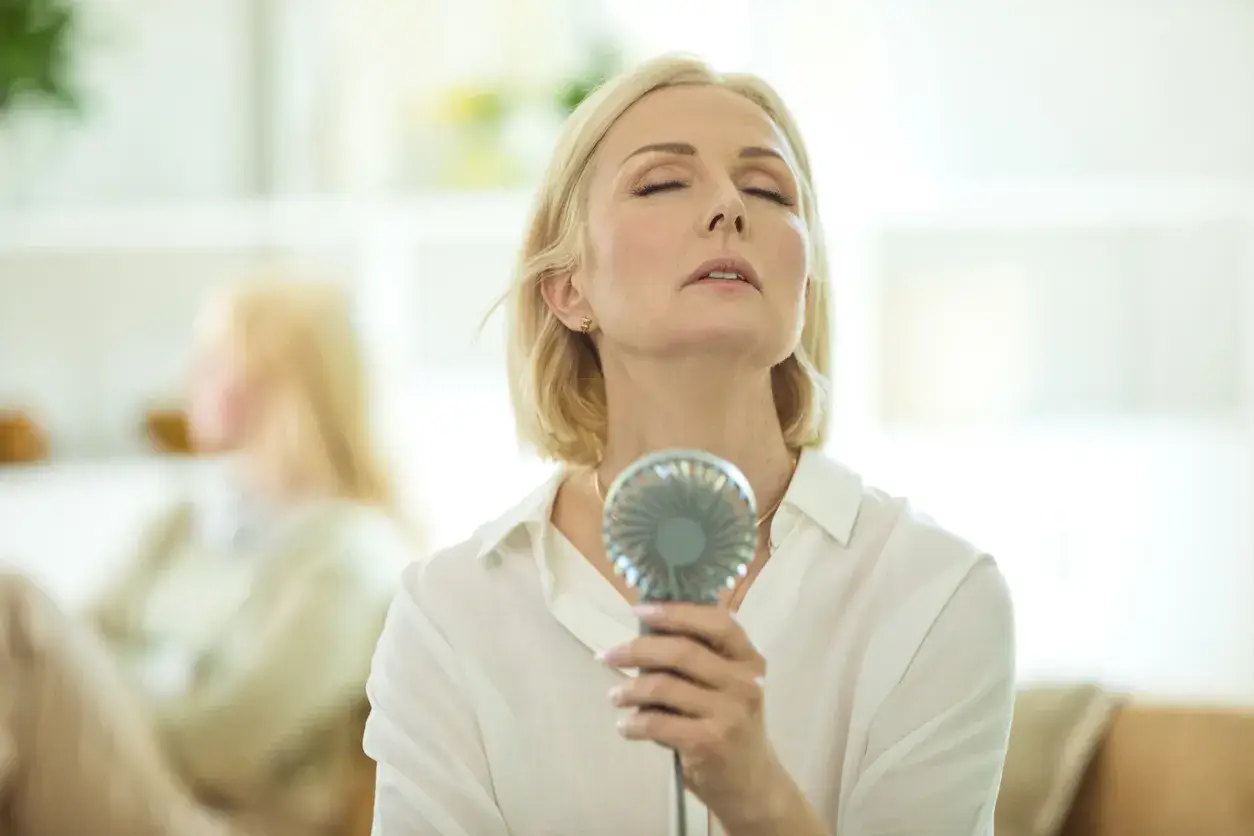5 mins read
How to manage those troublesome hot flushes during the festive season

With all the Christmas parties, festive drinks, and work shindigs in the calendar it can be an anxious time if you suffer from hot flushes. Particularly if you find social situations a bit tricky! Knowledge is often power, as they say, so read on to understand.
What happens in a hot flush?
We get hot flushes due to the hormone changes we experience during menopause. As our oestrogen levels start to drop, we become more sensitive to changes in our internal temperature.
I like to describe this as the body’s thermostat.
Before we start perimenopause, our body can fluctuate quite happily within a range of temperatures before getting too hot or too cold. If our temperature goes over the top of this range, we have a hot flush to cool down. If we get too cold, we have chills or shivers to warm up.
During the menopause, the range of temperatures our bodies can cope with narrows, so now, smaller changes in temperature can push us over the top of the band that our body can cope with, leading to a hot flush.
Simple things can push our body outside of this new range – these are our ‘hot flush triggers’. Often triggers are things like:
- Going from outside to inside on a cold day
- Wearing too many layers inside
- Drinking a hot drink
- Eating spicy food
- Rushing around
- Feeling strong emotions like anger or frustration – things that get us all riled up!
Although not all hot flushes have an identifiable trigger, many do.
These can be easier to spot if you keep a diary of your hot flushes for a week or so, noting down when you have a hot flush, how intense it was and what you were doing before you had it.
It can be useful to focus on what you were eating, drinking, thinking, feeling, doing just before the flush and see if you can identify any patterns. For some people, just knowing the things that are more likely to lead to a hot flush makes it feel a lot less distressing.
For others, spotting the patterns means they can make more informed choices on how they want to live or plan their day. They can make small changes to reduce the number of flushes or how intense they feel.
Does that mean I can’t drink alcohol if that’s a trigger for me?
Not at all.
It means you can decide when and how you drink alcohol so it has the least impact on your life!
So you may decide to only drink in certain situations, or on particular days of the week. Or you may decide that you are going to enjoy your drink and just be prepared for a hot flush coming. Perhaps you decide to sit by a fan or take off your coat or jacket.
The key factor here is that YOU have decided, YOU are in control. YOU know the flush may come but YOU decided that’s ok, the enjoyment is worth more in that moment.
This helps to reduce your distress and make it easier to cope with.
Why are hot flushes so tricky to manage in social situations?
We know that stress narrows the range of temperatures our bodies can cope with even further. So, before menopause, the temperature range was at its widest, during the menopause it narrows and during stress and menopause it is at its narrowest.
This is why you may find during the festive season, when there are lots of parties, and rushing around, and holiday stresses, your hot flushes become more frequent, or feel more troublesome.
Whilst the hot, bothered, sweaty feeling of a hot flush is uncomfortable and disabling, it is often the associated internal chatter that can be most detrimental to our mental health.
Imagine having a hot flush when you are at your work Christmas party. If you stop and listen to the thoughts going round and round inside your head, you may hear:
“They can see what a mess I look!”
“I bet they are having a right laugh at me!”
“I look disgusting!”
“Everyone can see me sweating!”
“I look a right state!”
“I can’t even enjoy my drink in peace!”
These types of thoughts make us feel more anxious, embarrassed and frustrated with ourselves, our menopause, the situation etc.
To relieve the discomfort, we may withdraw into ourselves, find it hard to follow the conversation, feel desperate to escape, focus on the bodily sensations as the flush takes over or even leave the party. Sadly, this can make the flush feel even worse!
How can I support myself mid-flush?
One way we can support ourselves in the middle of a flush is to focus on those thoughts and ‘flip them’ to be more positive and supportive. This takes practice but it can be done! So, when you catch yourself going down ‘negative lane’, say to yourself, stop, not helpful! And then focus on some more helpful thoughts like:
“So what if I am having a flush, I am enjoying my wine!”
“I am doing great!”
“This will pass in a moment!”
“Everybody gets them!”
If we focus on more supportive statements, we feel calmer, more accepting and empowered. This means we are more able to stay with the conversation, we continue to feel good and positive and we realise we can actually handle anything.
So, over the coming weeks when you are at your next Christmas event, I want you to try and catch your thoughts if you have a hot flush. Really try and ‘flip’ those thoughts to something more positive, something your best friend might say if they were there with you! Try it out and see how it makes you feel?!
- Health scores calculated
Close
This information has been medically written by Dr Beverley Taylor
Bev has been a Chartered Psychologist for over 10 years, obtaining a Doctorate in Health Psychology in 2010. She has worked as an academic researcher and research consultant before focusing on how she can support those with menopause via lifestyle, education, and one-to-one support. Bev regularly writes about psychology, menopause, and behavioural change and has attended numerous events as both a speaker and a panellist.

Dr Beverley Taylor
Menopause Expert
Related articles
Like this article? Here are some more based on similar topics.





